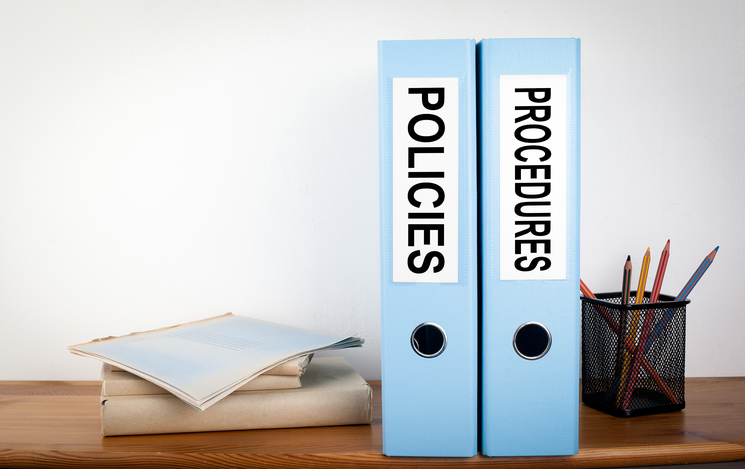Updating an internal policy is a big deal. It takes hours of planning and writing, then more hours of training, even if the change is only a few words or sentences. While policy updates impact all employees, the HR team feels them the most. They’re usually responsible for writing, enforcing, and informing employees about these changes, and those responsibilities can come with stress. Here’s how to prepare your HR staff to ensure your policy updating process is positive, not disruptive.
Why You Need to Update Your Policies
Writing policies requires many different people’s time, effort, and input. Once you’ve got the final product, you feel like you’re relaxed, right? Wrong. While letting your internal policies sit on a shelf is the easiest approach, it puts your organization at risk.
It’s crucial to consider the need to analyze and update your company policies not just occasionally but on an annual basis. Regular reviews are essential, especially when:
- A relevant workplace incident occurs (i.e., review safety procedures after an injury).
- There are new or updated laws or regulations related to the policy (i.e., data privacy).
- Best practices have changed (i.e., adding pronouns to employees’ email signatures).
- Employees voice concerns about the policy’s content.
Regular reviews of your internal policies ensure your company is up to date with industry best practices, compliant, and ethical. They can even save you from an employee complaint, grievance, or lawsuit regarding unjust practices.
Policy Update Training: For HR and Employees
You’ve meticulously crafted and reviewed your policy changes, but the work doesn’t end there. It’s crucial to ensure that employees are not only informed of these changes but also thoroughly trained on how to apply them. This comprehensive approach to policy implementation will instill confidence in the process and the changes being made.
Because the HR team enforces most internal policies, they need a separate training session before the rest of the company knows about the updates (more on that below). In this session, you will need to include not only the content of the policy itself but also how to tell if an employee is (or is not) following the new rules. Next, outline the consequences of violating this policy and how to handle a first, second, or third violation from the same employee. Leave lots of time for questions and open discussion, as you want to be sure your HR staff feels comfortable both abiding by and enforcing your policy changes.
In your general employee training sessions, focus more on the policy’s content, describing exactly what has changed. Explain what this means for expectations and protocols in the workplace. Offer realistic examples of behavior, asking employees why they think a scenario is or is not acceptable under the new policy. Finally, provide a quick overview of violation consequences; that way, your employees will not be taken off-guard but will focus mainly on how to comply rather than what happens if they don’t.
Prioritize Mental Health
Adapting to new or updated policies can be overwhelming for any employee. This is doubly true for the HR team, as they must remember the updates for their own use and answer questions from other departments’ employees. That’s why prioritizing your HR team’s mental well-being during policy changes is essential. Try these three tips when updating policies to ensure your team stays energized rather than burnt out.
First, HR staff should be provided with a structured learning process to learn and absorb the changes before they’re made official. HR is responsible for enforcing most internal policies (and will likely have to field questions about the updates), but it’s hard to do so when they aren’t well-versed in the content. A few weeks of structured learning, including Q&A sessions, before the changes “go live” gives the team time to ask their own questions and become experts, reducing stress.
Next, try not to change multiple policies at the same time, if possible. It’s hard enough to remember and answer employee questions about one policy; working on a few at a time will only cause confusion. Help your HR team avoid burnout by letting them focus on one policy update before shifting to another.
Lastly, mental health resources aren’t just for other departments! Policy changes can dramatically increase physical and mental workload, leading to burnout and anxiety. If you see an HR team member struggling, remind them of your company’s EAP, wellness events, or other resources that can support them.
Updating internal policies occurs in companies of every size and industry. It’s necessary to protect both the organization and your employees! Prepare your HR team for these changes to ensure their implementation is effective and seamless.
Shelby Veltkamp is the manager of human resources (HR) at Case IQ, a leading investigative case management software for ethics and compliance, HR, fraud and corporate security incidents within mid-sized and large organizations.

